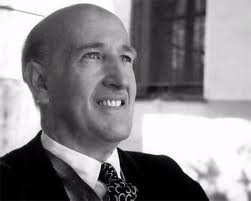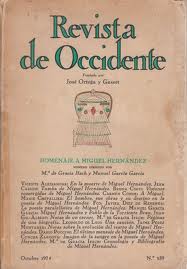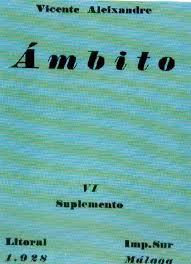Life & works of Vicente Aleixandre
Vicente Aleixandre was a Spanish poet, considered to be one of the great poets of the 20th century. He was a member of the Generation of '27, and was awarded the Nobel Prize of Literature in 1977. About his Nobel Prize, some have said it was not given to him just for his works, but in recognition of all the works of the writers of the Generation of '27.
Vicente Aleixandre - Life

Vicente Aleixandre was born in the city of Seville in 1898, finding himself in the midst of a bourgeois family who was quite well off. When he was 2 years old the family moved to Malaga, a city he called "Paradise" because he spent his whole childhood there. In 1909 they moved to Madrid, where Aleixandre studied in a school in Madrid and later enrolled in the University to study Law and Trade. He specialized in Trade Law and ended up teaching it in the Escuela de Comercio de Madrid from 1920 to 1922.
In 1917 Aleixandre met Damaso Alonso, and from that moment on he began to meet with the other youngsters of his generation who had felt an inclination towards literature. He also started to read the great Spanish poets, like Bécquer and Ruben Dario, and the works of foreign writers like the French Symbolists. This made him feel the need to start writing poetry.

He fell dangerously ill during the 20s, and from then on his health was frail. A bout of consumption affected one of his kidneys and it had to be extracted. While he was recovering from this operation he continued to write poems, and their publication in 1926 in the "Revista de Occidente" gained him some recognition, as well as lead to him befriending some other young poets of the Generation of '27, like Garcia Lorca and Cernuda.
After the Spanish Civil War, Aleixandre, who had remained in Spain, continued to develop a very personal poetic path. In 1949 he was chosen to become a member of the Real Academia Española, and from this moment onwards he became the great teacher and protector of the young Spanish poets of the second half of the 20th century. These young poets liked visiting Aleixandre in his house in Madrid, where literary gatherings and readings were quite frequent.
Aleixandre died in Madrid in 1984, far from his "Paradise" of Malaga.
Vicente Aleixandre - Works
Vicente Aleixandre was a complete poet, totally committed to the development of his poetry. He didn't write any other genre; his scarce prose texts (in which he describes other writers he knew) are as poetic as his verses, and his essays were mostly done on request.
The poetic activity of Vicente Aleixandre can be divided into several periods:
- Pure poetry: "Ámbito", written from 1924 to 1927 and published a year later, of the work of an incipient poet, one who hasn't found his voice yet. The predominant verses are the short, assonant ones, and his aesthetic is influenced by the works of Juan Ramon Jimenez and the classics.
- Surrealist poetry: between 1928 and 1932 he does through a radical change in his concept of poetry. Aleixandre is inspired by the early Surrealists and by Freud and he adopts prose poems as a way of expressing himself. The aesthetic of these poems are irrational, and the expression resembles automatic writing. The poet celebrates love as an ungovernable force that destroys all the limitations of human beings, and critiques the conventionalism with which society tried to restrain it.
- Anthropocentric poetry: Aleixandre's poetry changes after the war. He starts feeling closer to the worries of the social poetry. From a position of solidarity, he addresses the life of common men, their suffering and wishes. His style becomes simple and more accessible. His two main books in this period are "Historia del corazón" (1945) and "En un vasto dominio" (1962).
- Old age poetry: in his last books "Poemas de la consumación" (1968) and "Diálogos del conocimiento" (1974), the style of the Spanish poet changes again. The experience of his old age and the nearness of death take him back to the irrationalism of his young age, but in a more serene and pure form.


